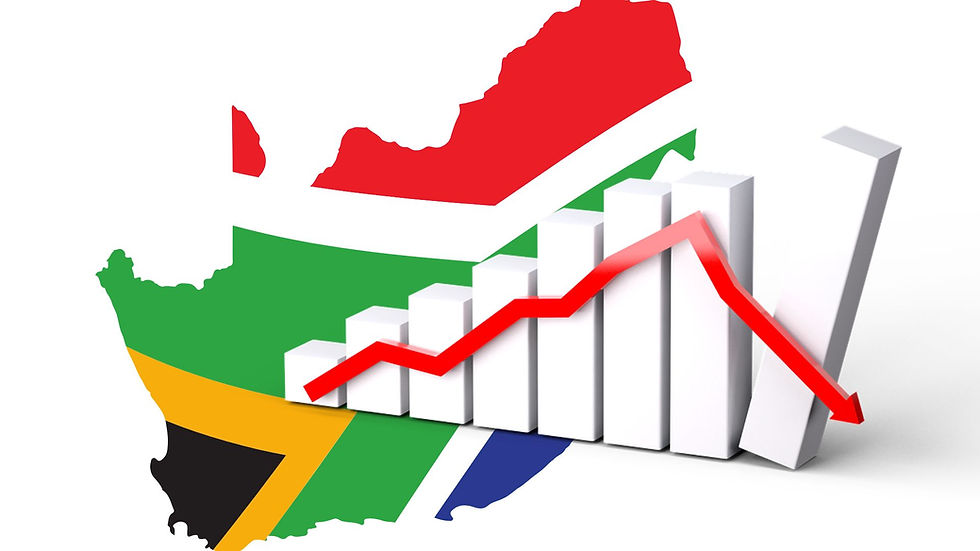Eskom’s Growing Debt Crisis: Is South Africa Facing Economic Collapse?
- BY MODERN OPULENT GAZETTE

- Oct 21, 2024
- 3 min read
South Africa’s economic stability faces a looming crisis, as Eskom's municipal debt continues to spiral out of control. Eskom, the country's main power supplier, could see its municipal debt balloon to R200 billion in just a few years if immediate action isn’t taken. This warning was sounded by Cosatu's parliamentary co-ordinator, Matthew Parks, during an interview with Newzroom Afrika.

Parks highlighted the critical role that reliable, affordable electricity plays in any modern economy, emphasizing that Eskom's financial troubles could threaten the country's entire economy. In 2023, the National Treasury introduced a debt incentive scheme to alleviate some of this burden, allowing municipalities to have a portion of their debt written off if they adhered to monthly payment schedules. However, out of 72 municipalities, only 14 have met their debt obligations, underscoring the scheme’s failure to deliver results.
Many municipalities, according to Parks, are in a "very, very serious crisis." Despite residents paying their electricity bills, municipalities are failing to pass these funds on to Eskom, digging an even deeper financial hole for the utility company. “It’s deeply alarming that Eskom was getting itself out of a hole, but municipalities are going and digging that hole deeper,” Parks said. Efforts by the National Treasury to provide financial relief, such as an R80 billion debt package for municipalities, have yet to curb the growing debt, which is set to reach R82 billion by the end of the year and escalate to R100 billion by the end of the tax year. If unchecked, this debt could soar to R200 billion by 2028, creating a situation no government bailout could resolve.
Eskom's Viability at Risk
Advertisement
As Parks put it, Eskom cannot continue to operate under these conditions if half of its customers—primarily municipalities—fail to pay their dues. Without a solution, Eskom will no longer be a viable business, and the ripple effect could cause the entire South African economy to collapse. One possible solution, according to Parks, is allowing customers to pay Eskom directly while municipalities retain responsibility for infrastructure maintenance. Eskom cannot continue to act as a “slush fund” for municipalities, and Parks emphasized the urgency of fixing both Eskom and the municipal financial system.
The Funding Model Problem
Advertisement
Municipalities have long relied on Eskom tariffs to fund other services, including subsidizing poorer communities and other municipal functions. While cross-subsidization is necessary, the current system is unsustainable. Parks called for a frank discussion on creating an alternative funding model for municipalities, stressing that employing Eskom as a financial crutch for these issues will lead the entire economy "down the drain."
Municipalities’ financial distress is largely due to their unsustainable revenue base. Many are too small to function independently and repeatedly fail to pay their debts, leaving Eskom—and, by extension, the national economy—on shaky ground. Parks proposed that consolidating some of the country's 257 municipalities into larger entities might be a solution, possibly through a district development model.
Local Government Collapse
Advertisement
The financial mismanagement of municipalities is not a new issue, but it has reached alarming levels. According to Parks, some municipalities have failed to pay municipal workers, pensions, and even to provide basic services, causing local businesses to close their doors. Compounding the issue is the mismanagement of infrastructure grants, with billions of rands returned to the national government due to municipalities' inability to spend them effectively.
The situation has been exacerbated by a lack of competent leadership, which has led to a widespread decline in local government. Auditor General reports paint a grim picture: about a decade ago, only 10% of municipalities were in distress. Today, that number has soared to two-thirds, and the situation continues to worsen each year.
National Government Inaction
Advertisement
Despite these growing concerns, Parks expressed frustration at the lack of intervention from national bodies such as the South African Local Government Association (SALGA) and the Department of Cooperative Governance and Traditional Affairs (CoGTA). He criticised these institutions for their "hands-off" approach, warning that without swift, decisive action, South Africa could witness the collapse of local government.
While there has been some progress at Eskom and Transnet, the broader picture is troubling. Parks described the current state of affairs as "the death of local government," and called for urgent attention from the highest levels of government.
Advertisement
As South Africa grapples with these challenges, the stakes could not be higher. Without reliable electricity and functional municipalities, the country's economic future is in jeopardy. Immediate and robust solutions are essential to prevent an economic collapse that would affect every corner of the nation.
























































